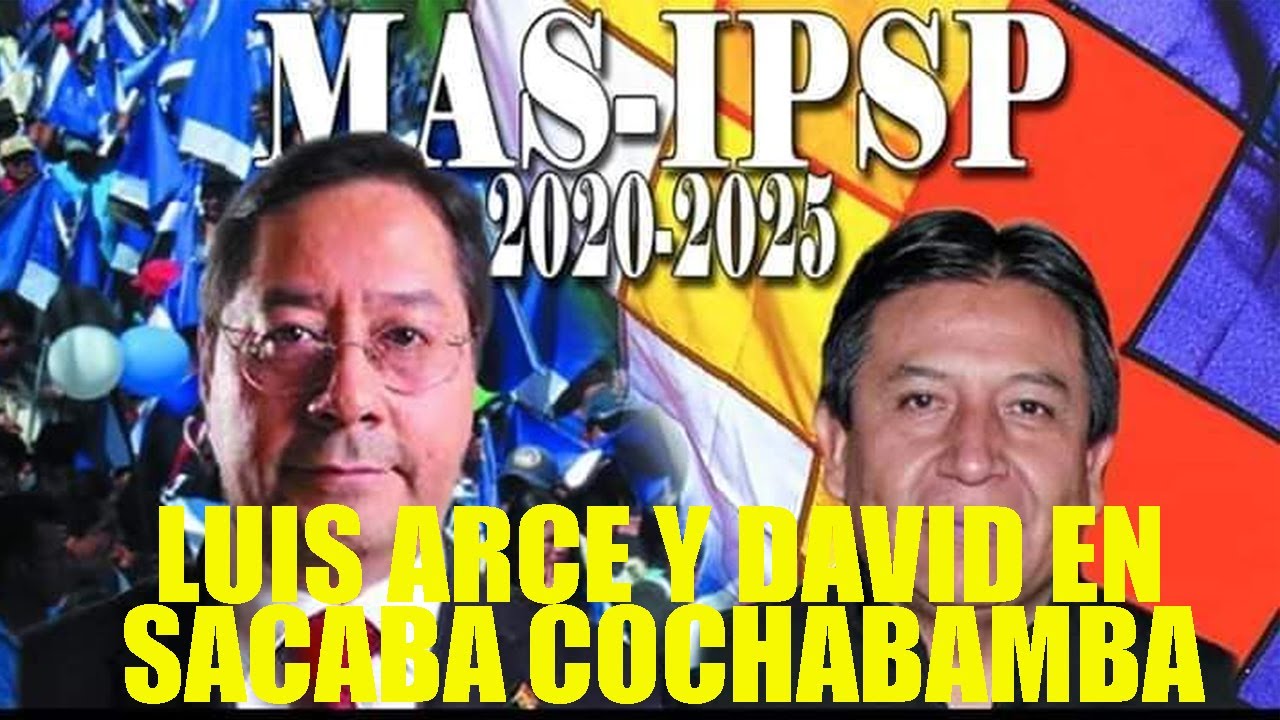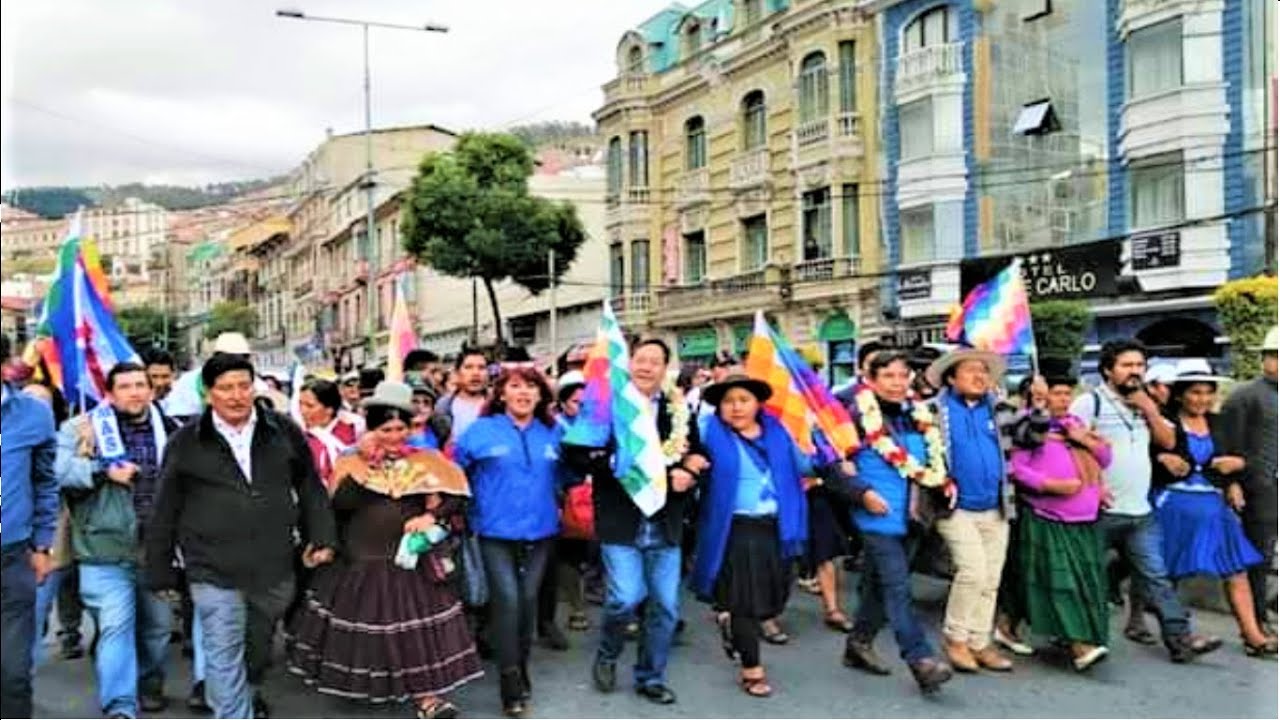
You tube kamina sur TV photo of the new president and vice-president.
A victory for the majority of Bolivians, a victory for the world’s poor, the indigenous, and supporters of equality, world peace, bread and land for all. October 19 exit polls show that the majority’s leader, Luis Arce, and running mate David Choquehuanca Céspedes, won the election.
With around a quarter of the votes counted, exit polls showed them ahead of rightest opponents with 52-53% of the vote. No runoff election will be necessary.
Opponents Carlos Mesa (a former president) and Luis Fernandez Camacho received around 30% and 14% of the voters. Both are right-wingers who aggravated a military-threatened coup last November. Mesa, and the self-appointed coup president Jeanine Añez, have admitted defeat.
Mesa was ousted from power in 2005 following large demonstrations against privatized natural gas companies. Camacho is known as the “Bolivian Bolsonaro” in reference to Brazil’s extreme right-wing president. Camacho’s hometown, Santa Cruz, is the stronghold of the separatist movement. He led protests that culminated in the coup against Morales.
Arce and Choquehuanca are leading members of MAS (Movement for Socialism), whose founding leader was Evo Morales, president 2006-17. They embrace the indigenous political tradition of Suma Qamaña, emphasizing reciprocity, collectiveness, and balance with Mother Nature (Pachamama).
(See also the excellent background article by Jeremy Kuzmarov, Covert Action Magazine managing editor. )
“We have recovered democracy,” Arce said in a public speech following the cited exit polls. “We promise to respond to our pledge to work and bring our program to fruition. We are going to govern for all Bolivians and construct a government of national unity.”
Luis Arce served as Morales’ minister of economy and public finance. David Choquehuanca served as the foreign minister from January 2006 to January 2017. A couple months later, he became secretary general of the Bolivarian Alternative for the Americas (ALBA).
Jeanine Añez supported Mesa’s candidacy after she dropped out of the election race. She received little support due to corruption scandals; abuse of civil liberties; backing police murders of three dozen indigenous people; a 30% decline in exports; eliminating the Ministry of Culture; reversing an EU-backed program allowing farmers to cultivate coca leaves for non-narcotic purposes; for allowing foreign corporations to control lithium resources; and poor response to the Covid-19 crisis, which has claimed 8,000 Bolivian lives and 130,000 infected out of a population of 12 million.
Twice postponed due to the corona virus, the October 18 election was the culmination of last year’s October election. In order to prevent a bloody civil war, Morales resigned under force and went into exile, first to Mexico and then to Argentina where he is today.
Morales received more votes than Carlos Mesa, who ran against him last year. Mesa, however, called Morales’ claimed victory a “fraud”, contesting the president’s assertion that he had won more than 50% of the votes, which meant there would be no runoff election. The US-dominated Organization of American States (OAS) claimed that Mesa was right.
The fraud allegation is discredited by researchers from the Massachusetts Institute of Technology (MIT) commissioned by a liberal research group based in Washington, D.C. They found that the OAS had overstated the significance of voting discrepancies from before and after a pause in the vote count.
“The OAS allegations were indeed the main political foundation of the coup that followed the October 20 [2019] election three weeks later,” wrote Mark Weisbrot, co-director of the Center for Economic and Policy Research last month. “But they provided no evidence to support these allegations—because there wasn’t any. This has since been established repeatedly by a slew of expert statistical studies.”
Military Threaten Coup
Perhaps the greatest error Morales made during his generally successful presidency was not to have reformed the military and police, placing anti-racists and pro-socialists in leadership. A year before his attempt to win a fourth term in office, Morales appointed General Williams Kaliman Romero to head the armed forces. Kaliman is one of six key Bolivian coup plotters who had been trained at the US military School of the Americas (SOA was renamed Western Hemisphere Institute for Security Cooperation). (1)
General Kaliman led the call for Morales removal. He publically stated, “We suggest the President of the State renounce his presidential mandate, allowing peace to be restored and stability maintained for the good of our Bolivia.”
Hours later, Morales said, “I am resigning”, adding it was his “obligation as indigenous president and president of all Bolivians to seek peace.” Vice President Álvaro García Linera also resigned.
Shortly thereafter, Camacho said, “Today we won a battle.” He then entered the government palace with a Catholic priest to “return God” to the palace. Camacho is a multi-millionaire who had spent years leading an overtly fascist separatist organization called the Unión Juvenil Cruceñista.
As soon as Morales stepped down, police ordered his arrest and vandals ransacked his house. Right-wingers happily burned the banner of Bolivia’s indigenous people, showing them that the white elite intended to put them back in their place.
President Donald Trump applauded the coup-makers. “The resignation yesterday of Bolivian President Evo Morales is a significant moment for democracy in the Western Hemisphere.” So much for democracy.

MAS supporters. You Tube Noticias Bolivia photo.
Morales-MAS Improved Living Standards
Arce and Choquehuanca ran a campaign based on MAS’s program without much discussion concerning Evo Morales. They have no quarrel, however, with the achievements made under his leadership. (See my piece on this site)
Poverty 2006=60%; 2018=34%; Extreme poverty 2006=38%; 2018=15%
Life expectancy 2006=62; 2015=69; Infant mortality 2006=46 per 1000 live births; 2018=28.8
Bolivia’s economy underwent structural transformation with nationalization of major resources. GDP= 5% to 5.5% annual growth for the last several years. Real (inflation-adjusted) per capita GDP grew by more than 50 percent over 13 years, twice the rate of growth for the Latin American and Caribbean region.
Unemployment 2006=5%; 2017=3.4%
Gender equality 2006=4% women in municipal assembly posts; 2015=50% in municipal posts, 53% in the parliament.
During Morales presidency, all persons 60 years old+ received state pensions, and hundreds of thousands affordable social housing units were built.
Nevertheless, Morales made serious mistakes that alienated many followers. In later years of his presidency, Morales focused power around his personality, reneged on promises, and made contradictory accommodations with some elite interests. He lost a referendum seeking a fourth term for presidency, but maneuvered around that decision. These errors immersed the country in political crises, and split leftists, including some indigenous peoples.
Conclusion
Much of the international “real left”, as opposed to liberal/progressives catering to capitalism, ignore left-wing government errors and corruptions—not just those of Comrade Stalin and Chairman Mao, but also of the new 21st century socialist-oriented governments, including in the ALBA countries.
I believe that we must put an end to patriarchal patterns of top-down leadership. Those of us living in countries where there is no current hope of electing people-oriented governments, and who support revolutions or major progressive shifts of power elsewhere, need to stop glorifying everything they do. To be true solidarity workers, to be true comrades, we need to point out major errors and “sins” where they exist. In that way, we offer real solidarity, and we prevent delusion amongst ourselves and those we wish to encourage and support.
El Pueblo Unido Jamás Será Vencido! The People United Will Never Be Defeated!
(1) The military renamed SOA because of effective protests, led by followers of the “theology of liberation”, against training Latin American militarists to use torture against leftist opposition activists and intellectuals. Protestors assert torture is still on the menu in disguise.
RON RIDENOUR is a US-born journalist and anti-war activist living in Denmark. He is a member of www.thiscantbehappening.net His books, “The Russian Peace Threat: Pentagon on Alert” and ‘Winding Brook Stories’ are available at Amazon and Lulu. His other work can be found at ronridenour.com; ronrorama@gmail.com
